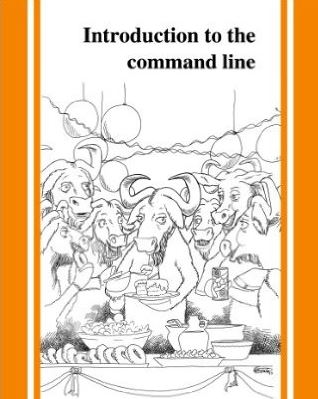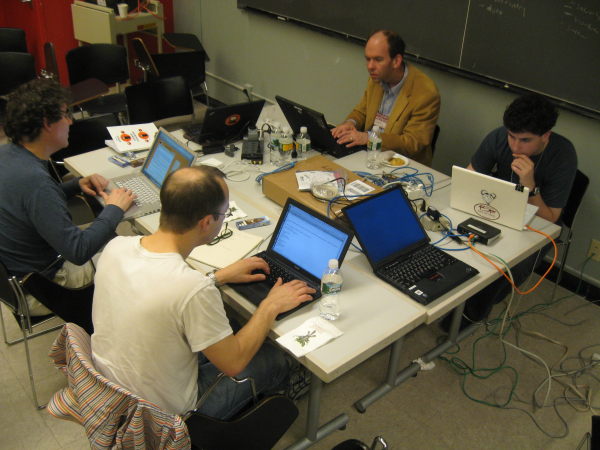In NYC for a day or two, then back to SF, and finally back to NZ! Whoot! in NZ most of Sept. Can’t wait .. my outside bath has hot water plumbed in now….. whoohoo! Pania my neighbor sent a pic of it in action! 🙂 Can’t wait!

In NYC for a day or two, then back to SF, and finally back to NZ! Whoot! in NZ most of Sept. Can’t wait .. my outside bath has hot water plumbed in now….. whoohoo! Pania my neighbor sent a pic of it in action! 🙂 Can’t wait!

Many years ago when I was experimenting with Book Sprints I suggested to the Free Software Foundation that we do a Book Sprint at the LibrePlanet meeting in Boston (2009). The idea was to make a book introducing people to the command line. I asked Andy Oram (friend and editor at O’Reilly) if he would help me put it together and so we announced it and both turned up at the event to make it happen.
The Book Sprint was meant to be an opt-in. So ‘anyone’ who was at the event could come in and write the book. Of course ‘everyone’ wanted instead to go to the presentations! So we had almost no one from the event attend…it felt very lonely for a bit…
Then, a few people turned up online and because they couldn’t participate with the conference they wanted to be part of LibrePlanet and contribute to the book. It was an astonishing thing. More and more people turned up. I remember going to bed on the first night (it was a 2 day Book Sprint) and feeling like all was not lost, waking up the next day and a whole lot more of the book was done. It was amazing.
There were some fantastic contributions and we coordinated it all through online chat (I think it was IRC but can’t remember). I remember in particular having a really lovely chat with one participant – I think their name was ‘Freaky Clown’ but I can’t remember for sure. I remember a sense of solidarity and peer-ness when talking to them about the book and the process. There were a lot of things that made that process special.
Anyways…we produced the book in 2 days and it is quite an amazing work.

It was on offer from FLOSS Manuals (still there – http://write.flossmanuals.net/command-line/introduction/), but more interestingly the Free Software Foundation offered it for sale – https://shop.fsf.org/books-docs/introduction-command-line
The cool thing about that was (apart from the FSF publishing it which was already pretty cool) that they used their own cover art etc and made it their own… freedom in action.
Apparently the book has been very successful – its used as a textbook, has been reviewed a lot, and seems to get a lot of use – but imagine my surprise when I saw in the LibrePlanet meet of 2018 this program item:
Introduction to the Command Line brainstorming session
We’re updating the popular 150-page Introduction to the Command Line. What do you think should be in the new edition? We’ll be discussing content and process for updating this important work.
A product of a partnership between the FSF and Floss Manuals, this book gives new computer users a gentle, beginner’s window onto Bash, vim, a few scripting languages, and other key tools offered on the Unix/GNU command line. A lot has happened since the book was released in 2009. We want to include new developments without substantially increasing the length of the book.
Pretty cool! Andy hosted the session and I hope it went well… very nice to think these crazy things you are a part of become something and take on a life of their own….
I even found the only image I know of taken at the event (by me) when (on the second day) some folks took pity on us sitting by ourselves and came in and contributed…Andy on far left.

I also found this old blog I did on the FSF site –https://www.fsf.org/blogs/community/introduction-to-the-command-line
Mako Hill on modern challenges to free software. Awesome.
Once upon a time there was pretty much one dominant way for open source projects to produce software. It was called the ‘itch to scratch’ model, as proposed by Eric Raymond in his book ‘The Cathedral and the Bazaar’.
I consider this model to be a cultural-method for producing software, in that not many formally learn this process, rather it propagates by participation and lessons learned are handed down from one person to the other either by witnessing events or discussing the pros and cons of how to make open source software. There are very few that book learn the process.
It was such a pervasive methodology that many have referred to it as ‘the open source way‘.
However, I think it is true to say that these days Open Source software (in the formal sense) has been produced in as many ways as there are to produce software. With that in mind, there do appear to be two dominant models now that have proven out over time…the first is the ‘Itch to scratch’ model where one or more developers (usually exclusively devs) have a problem and they work towards solving it with openly licensed code. The second I am not sure has a name, (it may do and I don’t know it) which I’ll call for now ‘enlightened self interest’. This second category is generally groups (any type of organisation) that work together to solve a shared need.
Just pinning this idea here for now…
Direct link to sign up here :
https://www.eventbrite.com/e/editoria-community-meeting-tickets-47285686762
We are testing out our first automated deployments with Editoria. Working pretty well…we have some testing orgs already…more info soon!
Impressed by PubSweet, the @CokoFoundation toolkit for creating publishing platforms. Described in detail in their new book: https://t.co/f0Eg7PgmCH. Technical, but very clear. On the flexibility of attribute-based access control over role-based access control: pic.twitter.com/akNwEwZgBo
— Ari Bader-Natal (@aribadernatal) August 9, 2018
First time I’ve had my face on a poster!
Adam Hyde, Co-founder @CokoFoundation is joining our speaker list for Open Source Lisbon 2018 (September 27), sharing his experience and expertise in open source projects.
Read more about Adam at: https://t.co/lSy81RprDd#OpenSourceLx #OpenSource #OpenSourceEvent #FOSS pic.twitter.com/T33PD48Hv0
— Open Source Lisbon (@OpenSourceLx) August 7, 2018
I feel compelled to write a rebuke of an article, but that article is soooo bad I can hardly stomach the idea. It’s a pitiful, badly argued, and counterfactual rambling about the dangers of open source for publishing… I cringe at the thought of replying because I just don’t want to give any extra air to such a ridiculous ramble, but at the same time it appears that some in the publishing sector have been misled by it…. sigh….even reading it feels like pulling teeth. Ugh…stay tuned… or not… :